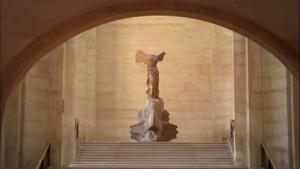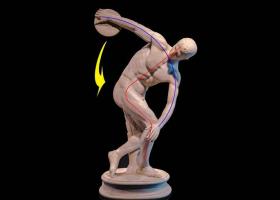Not pass! by Dolores Ibárruri: Discourse Analysis
"Not pass!" It is the desperate cry, in the form of a speech, that Dolores Ibárruri broadcast on the radio from Madrid during the proliferation of fascism and the beginning of the Spanish civil war.
NOT PASS!
Workers! Farmers! Anti-fascists! Patriotic Spaniards! In the face of the fascist military uprising, everyone on their feet, to defend the Republic, to defend popular freedoms and the democratic conquests of the people.
Through the notes of the government and the Popular Front, the people know the gravity of the current moment. In Morocco and the Canary Islands, the workers, together with the forces loyal to the Republic, fight against the military and fascists who have risen up.
Shouting "fascism will not pass, the executioners of October will not pass!" the workers and peasants of different provinces of Spain join the fight against the enemies of the Republic raised in weapons. Communists, Socialists and Anarchists, Democratic Republicans, soldiers and forces loyal to the Republic have inflicted the first defeats on the factionalists, who dragged through the mud of betrayal the military honor that they have so many times boasted.
The entire country vibrates with indignation at those heartless people who want to plunge democratic and popular Spain into a hell of terror and death. But they will not pass! The whole of Spain is preparing to fight. In Madrid, the people are on the streets, supporting the government and encouraging it with its determination and fighting spirit so that it reaches the end in the crushing of the military and fascist rebels.
Young men, prepare for the fight! Women, heroic women of the people! Remember the heroism of Asturian women in 1934; You too fight alongside men to defend the life and freedom of your children, which fascism threatens! Soldiers, sons of the people! Stay faithful to the government of the Republic, fight alongside the workers, alongside the forces of the Popular Front, alongside your parents, your brothers and colleagues! Fight for the Spain of February 16, fight for the Republic, help them to triumph!
Workers of all trends! The government puts in our hands the weapons to save Spain and the people from the horror and shame that the triumph of the bloody executioners of October would mean. Let no one hesitate! All ready for action. Every worker, every anti-fascist must consider himself a soldier in arms.
Towns of Catalonia, Vasconia and Galicia! All Spanish! To defend the democratic Republic, to consolidate the victory achieved by the people on February 16. The Communist Party calls you to fight. He especially calls you, workers, peasants, and intellectuals, to occupy a position in the combat to definitively crush the enemies of the Republic and of popular liberties.
Long live the Popular Front! Long live the union of all anti-fascists! Long live the Republic of the people! The fascists will not pass! Not pass!
Speech analysis
The interlocutor appealed directly to the people to fight for the preservation of the Republic. Specifically referring to the period known as The Second Spanish Republic (1931-1939).
Workers! Farmers! Anti-fascists! Spanish patriots... In the face of the fascist military uprising, everyone on their feet, to defend the Republic, to defend popular freedoms and the democratic conquests of the people ...
The republican regime was proclaimed in 1931 to replace the monarchical system headed by Alfonso XIII.
During this stage, progress was made thanks to the implementation of social reforms that benefited the working conditions of the workers. Also, in education, the new laws achieved the highest rates of female schooling.
Dolores asks that the people fight for the survival of all the achievements achieved and for those to come.
Uprising against the republican government
“Through the notes of the government and the Popular Front, the people know the gravity of the current moment. In Morocco and in the Canary Islands, the workers, united with the forces loyal to the Republic, fight against the military and fascists in revolt ”.
In this fragment she refers to the coup that began on July 18, 1936. A military uprising against the Government of the Republic, led by General Francisco Franco, who was in the Canary Islands at that time.
The military rebellion counted on the African army, one of the most prepared, and it exploded successfully in Morocco until reaching some points of the peninsula.
As Dolores points out, many workers fought against the military who wanted to undermine the government system.
Asturias Revolution of 1934
To the cry of fascism will not pass, the executioners of October will not pass... The workers and peasants of different provinces of Spain join the fight against the enemies of the Republic in arms. The communists, the socialists (…) have inflicted the first defeats on the factionalists, dragging the military honor that they have so often boasted through the mud of betrayal.
In this part, Dolores continues with the exposition of the facts and refers, for the first time in this speech, to the October 1934 revolution that had Asturias as its main stage. He alludes to the clamor of the workers and peasants with the phrase "fascism will not pass!", Which he later reduces to "they will not pass!"
The whole country vibrates with indignation at these heartless people who want to plunge democratic and popular Spain into a hell of terror and death.
But they will not pass!
The motto "They will not pass!" it was previously pronounced during World War I by French General Robert Nivelle.
Thanks to this slogan, the discourse of politics acquires more emphasis. Under the cry of They will not pass!, Pasionaria, twenty years after the war, uses the slogan to reinforce the previous message.
Madrid as the tomb of Francoism
The whole of Spain is preparing for combat. In Madrid the people are on the streets, supporting the government and stimulating its determination and spirit of the struggle so that it reaches the end in the crushing of the military and fascist rebels.
During the Civil War, the Spanish geography was divided into two camps: national and republican. Madrid proved to be the nucleus of the resistance to the more than possible triumph of the Franco dictatorship.
The people of Madrid had at heart the fight for the preservation of freedoms. He demonstrated admirable unity in the defense of the Spanish capital, which remained republican until the end of the war.
With these words, she wanted to put Madrid as an example of resistance and call the different peoples of Spain to the cause until the last consequences.
The role of women during the 1934 revolution
From this moment on, it directly encourages different groups to fight for a democratic country.
Women, heroic of the people! Remember the heroism of Asturian women in 1934; You too fight alongside men to defend the life and freedom of your children, which fascism threatens!
Dolores encourages women and again highlights the October 1934 revolution.
In the 1933 elections, the republican government turned upside down with the triumph of the PRR (Radical Republican Party), however, it did not obtain an absolute majority to she governed and needed the support of the CEDA (Spanish Confederation of Autonomous Rights), a bourgeois party of the extreme right, which requested portfolios in some ministries.
In 1934, due to the political and social instability of the country, a general strike was declared by the workers. However, in Asturias workers revolts broke out that turned the strike into a real revolution.
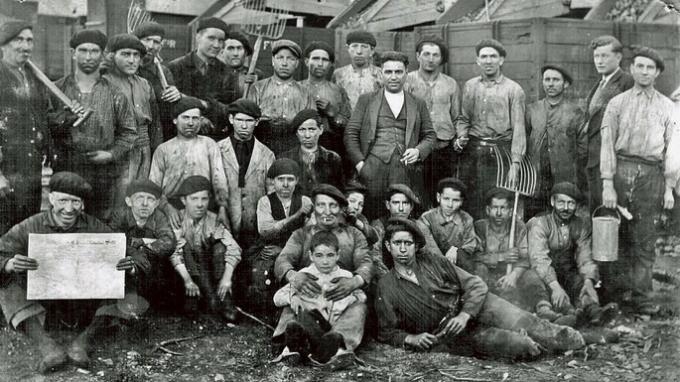
In Spain, women had a helpful role and were mired in a patriarchal society. However, during the October 1934 revolution, women participated in the struggle for workers' rights. Thus, they blurred the boundaries of sex and altered the primitive division of roles.
In this fragment, the speaker includes the woman in her speech, something unusual at the time. She too, she equates her role with that of man. It makes it clear that, in those days of revolution, women played an essential role and fought alongside men to achieve a society free of exploitation.
The dawn of the Spanish civil war
Soldiers sons of the people! Stay faithful to the government of the Republic, fight alongside the workers, alongside the forces of the Popular Front! (…)
Workers of all trends! The government puts in our hands the weapons to save Spain and the people from the horror and shame that the triumph of the bloody executioners of October would mean.
Let no one hesitate, all ready for action! Every worker, every anti-fascist must consider himself a soldier in arms.
The revolution in Asturias succeeded in uniting the left parties, which had been very divided shortly before. Consequently, the Popular Front was created in 1935, a center-left coalition led by politician Manuel Azaña.
In this part of the speech, he shows the dawn of a contest that would last four years. La Pasionaria cites soldiers and workers of any kind and, for the first time, refers to weapons, a fact that demonstrates the seriousness of the conflict.
With these words he reveals a combat. It is an invitation to the conversion of any ordinary citizen into a soldier willing to go to the extreme in order to protect the Republic.
Desperate song to the union of the peoples
Towns of Catalonia, the Basque Country and Galicia! All Spanish! To defend the democratic Republic, to consolidate the victory achieved by the people on February 16.
The territorial division of the country during the Second Republic was different from the current one, in force since the 1978 constitution. Here, Dolores mentions Catalonia, the Basque Country and Galicia, the territories known as “historical nationalities”.
Between the declaration of the Second Republic in 1931 and the start of the Civil War in 1936, only these territories mentioned by Dolores managed to put their autonomy statutes into effect.
That is why the speaker explicitly differentiates the Autonomous Regions (with statute) from Non-Autonomous Regions (without statute). In this way, with the expression "all Spanish!" It aims to unite all the territories, without distinction, by and for the cause.
The communist party calls you to fight. She especially calls you, workers, peasants, intellectuals, to occupy a position in combat to definitively crush the enemies of the Republic and of popular liberties. Long live the Popular Front! Long live the union of all anti-fascists! Long live the Republic of the people! The fascists will not pass! Not pass!
Dolores Ibárruri's allegation closes with these words, where she reiterates the message that the Communist Party intends to convey to the people.
A motto without borders
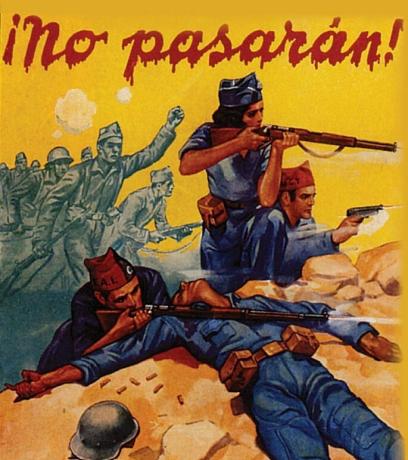
"Not pass!"(Ils ne passeront pas!, They shall not pass). Thus, in a vindictive and forceful way, La Pasionaria emphasizes her speech with this motto that passed directly from her mouth to wallpaper the streets of Madrid, crossing space-time borders and even becoming the international slogan of struggle anti-fascist.
Context of speech
This speech was delivered on July 19, 1936. One day after General Francisco Franco sent a statement from the Canary Islands to Spain peninsular, in which she revealed her intention to rise up with a large part of the army to put an end to the Republic.
In the 1930s, a group of hopeful women emerged in Spain to transform the situation of exclusion experienced by women in the country. Among them was Dolores Ibárruri. Thus, in this period of the Republic, women won for the first time seats in parliament, also the right to vote and divorce.
Dolores, defender of democracy and aware of the results that had been obtained in this republican period, especially in matter of freedoms and rights of workers, she knew that if the coup d'état triumphed all the achievements achieved they would disappear.
With this speech, delivered at the dawn of the Spanish civil war, La Pasionaria wanted to put express its concern to save and defend social policies against the proliferation of fascism in Spain.
Biography of Dolores Ibárruri
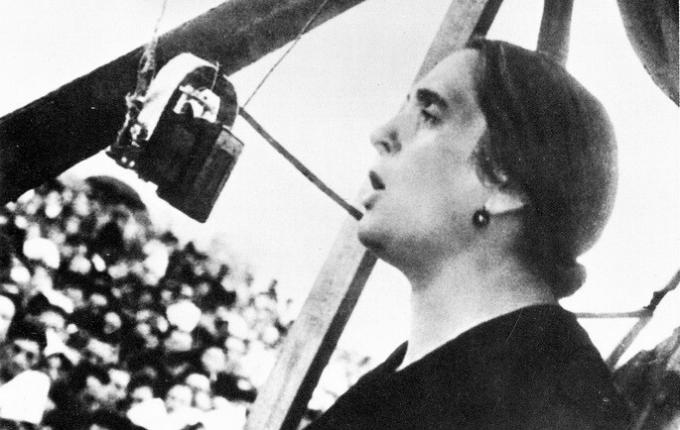
Dolores Ibárruri, la Pasionaria, was a Spanish communist leader. She was born in Vizcaya on December 9, 1895 into a mining family.
She wanted to dedicate herself to teaching but her parents did not allow her to study, so she dedicated herself to sewing in a sewing workshop.
In 1916 she married a miner and socialist militant with whom she had six children, of whom only two survived.
She was part of the PSOE (Spanish Socialist Workers Party), although later she supported the split of another branch of the party that was born with the name of PCE (Communist Party of Spain). In 1930 she was part of the Central Committee of the party.
After the Civil War, her party was outlawed and she had to go into exile in the Soviet Union. In 1942 she became secretary general of the PCE until 1960.
With the end of the dictatorship, she returned to Spain and was elected congressman for Asturias in 1977.
La Pasionaria, a symbol of resistance and a tireless fighter for the survival of the Second Republic, died on November 12, 1989 in Madrid.

